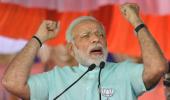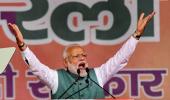The party’s research department team, which Rajya Sabha member M V Rajeev Gowda heads, has sifted through the suggestions received in the last five months, and the manifesto is slated to be released later this month, reports Archis Mohan.

Minimum income guarantee for the poor, urban employment guarantee, agrarian reforms aimed at landless cultivators and ending farm indebtedness, setting up a ‘bad bank’ for banking reforms, and a statutory calamity fund for states are some big ideas the Congress party has received as part of its over five-month long consultations with stakeholders to draft its manifesto for the 2019 Lok Sabha polls.
The manifesto is slated to be released later this month.
The manifesto consultation exercise, termed ‘Jan Awaaz 2019’, or ‘Your Voice 2019’, began in October under the leadership of manifesto drafting committee chief and senior party leader P Chidambaram.
The 22 members of the committee held 174 consultations, including 121 public consultations and 53 with experts since October.
The process covered 57 cities and 27 states and Union Territories.
Congress president Rahul Gandhi attended the party’s outreach to non-resident Indians by holding consultations with them in Dubai in February.
The party’s research department team, which Rajya Sabha member M V Rajeev Gowda heads, has sifted through the suggestions received in the last five months.
For the Congress, it has been one of its largest manifesto drafting exercises.
Party leadership said the suggestions were being studied, and only some of them would find place in the final draft of the manifesto.
The team conducted consultations and received inputs primarily in Hindi and English, but also a significant number were in Kannada, Tamil, Malayalam, Telugu, and Nepali.
The Congress had done similar, but smaller, exercises to draft its manifestos for the assembly polls in Gujarat in 2017, in Karnataka, Madhya Pradesh, Chhattisgarh, and Rajasthan in 2018.
Rajasthan Engineers Ekta Association, Andhra Pradesh State Handloom Weavers Cooperative Society and hundreds of organisations of all hues sent in their inputs or met members of the manifesto drafting committee over the last five months.
The bigger consultations were held in Aligarh with farmers on October 12 and on economic policy in Mumbai on October 27.
Chidambaram chaired the Mumbai meeting.
Former Haryana chief minister Bhupinder Hooda chaired the meeting in Aligarh.
Gowda held a meeting on start-ups in Bengaluru, while party leader Bhalchandra Mungekar held consultations on educational policy with academicians and teachers.
Interesting suggestions came up during Congress training cell chief Sachin Rao’s consultations on unorganised sector and urban issues.
Participants suggested an urban employment guarantee law, on the lines of Congress-led United Progressive Alliance government’s Mahatma Gandhi National Rural Employment Guarantee Act to provide guaranteed employment to the urban poor.
Party leader Jairam Ramesh led consultations on environmental issues where participants suggested the need for ‘green budgeting’ and preparing ‘green national accounts’ to underscore the importance of sustainable development.
Some of these ideas were part of the 2014 Lok Sabha manifesto of the Congress party.
On economic policy, experts suggested instituting a ‘bad bank’ to resolve the banking crisis and strengthening the institutional autonomy of the Reserve Bank of India.
The Congress also received inputs that expressed concern at the dilution of anti-corruption laws in the last five years and the need to strengthen these, particularly the Prevention of Corruption Act.
An interesting recommendation to do with judicial reform dealt with putting in place a cadre of young lawyers, who should be paid by the state for a couple of years at the start of their careers, to help the poor get access to justice.
On the micro, small & medium enterprises sector, the Congress received feedback that the sector suffered because of demonetisation and “hurried” implementation of the goods and services tax.
Experts suggested that number of people an MSME employs, and not turnover, should be the criteria to define MSME units.
After the experience of Kerala floods and the difficulty the state experienced in accessing funds, there were suggestions that the Centre should institute a statutory calamity fund for states.
On farm distress, the Congress was urged to commit to two bills moved by farmer organisations that deal with ensuring remunerative prices of their produce to farmers and freedom from indebtedness.
Experts pointed out that farm loan waiver and Narendra Modi government’s Kisan Samman Nidhi scheme helped only the landholding farmers, many of whom are absentee landlords, but ignored cultivators.
The manifesto could look into suggesting ways to ensure better access to institutional credit to tillers.











